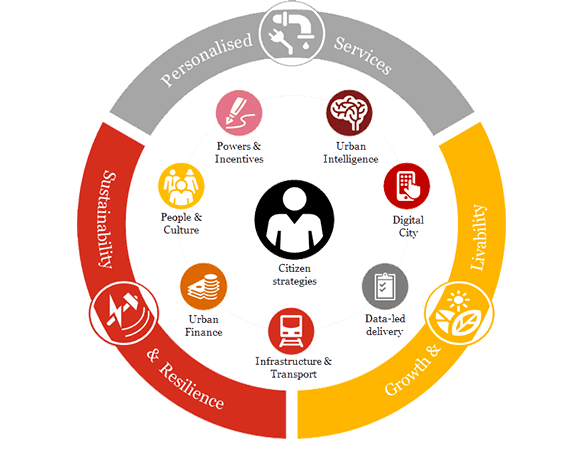Creating cities of opportunity
PwC works alongside local and national governments, and often with the support or collaboration of a range of development partners around the world, to help address the challenges of rapid urbanisation.
Operating across PwC’s global network, our multidisciplinary Cities & Urbanisation team have worked at the leading edge of these issues in over 20 countries and are now able to bring PwC’s full range of professional service capabilities to make every city a City of Opportunity.
City problems
PwC Cities and Urbanisation
PwC’s Future Cities model asks how cities can meet the needs of changing citizens in a changing world.
Future Cities
PwC’s Future Cities model asks how cities can meet the needs of changing citizens in an evolving world. We consider the outcomes that make a successful city of the future, and the strategies and capabilities cities must adopt to achieve these.
These include areas, both traditional and modern, that should be high on all cities’ agendas. Although some of these may gain more press coverage, we do not view any one area as more important than another. Every city has its own problems, culture, capacity and politics and these determine what will work best.
Our focus is primarily to help city governments succeed, but there are few urban problems that can be solved without the involvement of local businesses, charities, communities, academics - and you and me.


City capabilities - Enabling how cities work
Cities are built around departments for good reason – they house specialist skills and institutional knowledge. But there are some functions which cross many departments and which also require specialist skills. We recognise seven areas which have potential to be transformative if cities get them right: Powers & Incentives, Urban intelligence, Digital city, Data-led delivery, Infrastructure & Transport, Urban Finance and People & Culture.
These functions will exist to some degree in all cities, even if they are called different things, but they typically fit into the existing department system. Digital will fall under traditional IT. Separate asset registers may exist for water and electricity, and revenues will be collected by different contractors. Innovation rarely exists outside of HR and by-laws remains unchanged for decades at a time.
In our view, investment in these seven cross-city capabilities would create teams to focus on these areas, with the potential to make departments able to deliver much more effectively.
See each of the seven capabilities in more detail by clicking the button below.

Municipal Performance Index
PwC’s Municipal Performance Index (MPI) is a detailed benchmarking tool by PwC that measures performance in three major areas: socioeconomic, service delivery, and governance. These major categories are broken down into policy performances which are specific to the various areas and using certain KPI’s to measure the varied policy performances, which contains information across all 36 states in Nigeria.
There is a huge amount of data available in the public sector, but it is inconsistent, untimely and released by different sources. In order to improve municipal performance, you need to be able to meaningfully compare municipalities to identify where limited resources should be targeted.
Our MPI asserts that good government at any level means achieving three things: socioeconomic outcomes, service delivery, and municipal governance.
These are split down further into 23 categories, and over 1,000 individual indicators; Socioeconomic success is measured in areas such as health, education and safety; Service delivery includes water, electricity and transport; Governance involves financial health, audit findings and diverse staff.
Why work with us
PwC works alongside local and national governments, and often with the support or collaboration of a range of development partners around the world, to help address the challenges of rapid urbanisation. Operating across PwC’s global network, our multidisciplinary Cities & Urbanisation team have worked at the leading edge of these issues in over 20 countries and are now able to bring PwC’s full range of professional service capabilities to make every city a City of Opportunity.
“There is no ‘right’ way to run a city, but all cities can be run better. At PwC we work with city governments to navigate a changing world and changing citizens, helping them to become ‘Future Cities’ for the people who live, work and play there”
City outcomes - Understanding city success
- Personalised Services
- Sustainability and Resilience
- Growth and livability
Personalised Services
Treat citizens like customers
Citizens have diverse and complex needs which vary with their life stage and circumstances. In the long run, cities must distribute resources in a way that considers the whole needs of current and future citizens.
Citizen strategies - Changing how cities think
- Collaboration
- Transversal management
- Work together
Collaboration
Many organisations we work with struggle to understand and engage their customers. Cities are no different, except that they have less incentive to do so - citizens cannot cancel their subscription. But the gains to be made are just as real. Active citizen centricity - such as personalised services and billing - requires engagement and data. Passive citizen centricity, including online ‘self-service’ applications, is a good place to start. In the longer term, balancing citizen goals is difficult - as highlighted by our seven citizen lenses.









